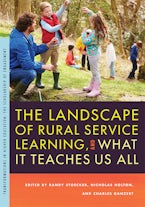Up until now, the majority of literature about service learning has focused on urban areas, while comparatively little attention has been paid to activities in rural communities. The Landscape of Rural Service Learning, and What It Teaches Us All is designed to provide a comprehensive look at rural service learning. The practices that have developed in rural areas, partly because of the lack of nonprofits and other services found in urban settings, produce lessons and models that can help us all rethink the dominant forms of service learning defined by urban contexts. Where there are few formal organizations, people end up working more directly with one another; where there is a need for services in locations where they are unavailable, service learning becomes more than just an academic exercise or assignment. This volume includes theoretical frameworks that are informed by the rural, concrete stories that show how rural service learning has developed and is now practiced, practical strategies that apply across service learning contexts, and points to ponder as we all consider our next steps along the path of meaningful service learning.
ContentsIntroduction: Why Rural Service Learning? by Charles Ganzert, Nicholas Holton, and Randy StoeckerPart 1. Rural Service Learning in ContextThe Landscape of Rural Service Learning, by Nicholas Holton, Karen McKnight Casey, Cynthia Fletcher, Charles Ganzert, John Hamerlinck, Steven Henness, Pam Proulx-Curry, J. Ashleigh Ross, Heidi A. Stevenson, Randy Stoecker, Sophie Tullier, and Spencer D. WRural Service Learning on the Blue Bus: A Retrospective in Hopes of Advancing Transformative Civic Engagement in Higher Education, by Eva M. HagenhoferGeographic Disparities in Access to Higher Education Service Learning, by Randy Stoecker and Charity SchmidtStudent Voice in Rural Service Learning, by Sophie TullierRural Service Learning: Boundary Spanners’ Perspectives, by J. Ashleigh Ross and Randy StoeckerPart 2. Rural Service Learning in PracticeBeyond Service Learning: Living Democracy in Rural Alabama, by Blake EvansFood for Thought: A Product-Model Service Learning Experience for Environmental Science Students at a Rural Campus of the University of Wisconsin Colleges, by Lauren WentzService Learning and Rural Development in West Virginia: A Community Center Approach, by Chris Baker and Corey DolgonNaadamaage Kinomaagewin: Service Learning in Native American Studies, by Martin ReinhardtRural Service Learning as Participatory Action Research: Lessons from Central Pennsylvania, by Brandn Green, Heather Feldhaus, Ben Marsh, and Carl MilofskyTargeted Student Engagement in Rural Communities: Pairing Select Students with Community Organizations to Link Service Learning and Community-Based Research, by M. Beth White and Spencer D. WoodUsing a Group Community-Based Research Project in the Introductory Sociology Class as an Exercise in Public Sociology, by Shelley L. KochStriving for Academic Service Learning Success in a Rural K–12 Tribal School, by Judith PuncocharOur Work in Progress: Service Learning and Rural Communities Partnering in a College-Ready Writers Program, by Marisa Sandoval Lamb and Flora Ann SimonPart 3. Rural Service Learning Looking ForwardService Learning in the Rural Community College, by Nicholas HoltonReasonable Care: Risk and Liability in Service Learning, by Charles GanzertOrganic and Dynamic: How Systems Theories Can Inform Rural Service Learning Practice, by Heidi A. StevensonConclusion: Rural Service Learning as Innovation in the Hinterland, by Charles Ganzert, Nicholas Holton, Randy Stoecker, Karen McKnight Casey, Cynthia Fletcher, John Hamerlinck, Steven Henness, Pam Proulx-Curry, J. Ashleigh Ross, Heidi A. Stevenson, SophiAbout the Contributors

